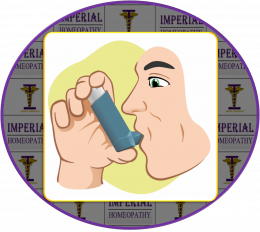What is Asthma?
Asthma is a common chronic lung disease which causes inflammation and narrowing of the airways. This includes chest tightness, dyspnoea (shortness of breath), coughing and wheezing.
Causes of Asthma
People with the family history of asthma are more prone to the disease. Environment also plays an important role in the development of the disease.
Certain Triggering factors of asthma:
- Dust and smoke. Pollution.
- Cigarette smoking.
- Animal dander like hair and skin. Bird feathers that can cause allergic reactions in some people.
- Any kind of physical exertion such as exercise, running, ascending stairs etc.
- Viral or bacterial infections such as mild cold or cough can aggravate the existing condition.
- Change in weather.
- Heavy meals may worsen the disease.
- Emotional stress.
- Certain medications like ibuprofen, aspirin, beta blockers etc.
What happens in Asthma (Pathogenesis):
There are 3 contributing factors to airway narrowing in asthma:
1.Mucosal swelling or inflammation- There is inflammation of the inner lining of the airways due to certain immune cells which are released (mast cell and basophil granulation) due to allergens. Thus leads to narrowing/constriction of the airways.
2.Bronchial muscle contraction- When airways reacts to the allergens it causes bronchial muscle to tighten and thus reducing the flow of the air into the lungs.
3.Mucus production- cells in airway starts producing more mucus which further narrows the airway.
All these above contributing factors thus causes cough, shortness of breath, chest tightness, and wheezing.
Symptoms of Asthma
- Difficulty in breathing.
- Shortness of breath.
- Tightness and pain in the chest.
- Cough associated with it.
- Wheezing (whistling sound while breathing).
- Tired easily with sweating.
- In severe condition, lips turn blue in colour during the attack.
Complications of Asthma
- Pregnant women having asthma may suffer with high blood pressure and early labour pain. Newborn would have the same respiratory troubles.
- Sometimes asthma patients do not respond to bronchodilator which is known to be the first line of treatment.
- Acute respiratory failure- There could be an emergency where bronchial tubes of a diseased person block or collapse.
- Side effects of medications.
- Asthmatic patients suffer with stress, anxiety, and depression.
Preventive measures
Avoid the known triggers such as cigarette smoking. Dusty area. Crowed place where chances of infection are more. Limit physical exertion.
Conventional treatment for Asthma
1. Inhaled corticorsteroids.
2. Long-acting beta agonists.
3. Short-acting beta agonists.
4. Combination inhalers.
Homeopathic treatment for Asthma
Homeopathic medicines are very effective in treating asthma. it deals with both acute and chronic asthma. It increases the immunity power of an individual and thus helps in reducing the frequency, intensity, and recurrence of the asthmatic attack. It also helps in reducing the infection of sore throat, frequent cold and cough, bronchitis etc. It also helps in reducing the dependency on inhalers.
It helps you fight the precipitating factors like allergens.

